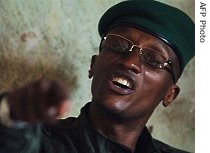2007年VOA标准英语-Ceasefire Reveals Early Cracks in Eastern DRC(在线收听)
Dakar
07 September 2007
Many civilians in eastern Democratic Republic of Congo are hoping for a ceasefire between the army and renegade fighters, but the rival forces as well as U.N. officials are giving conflicting information about what is happening and how to stop the violence. Selah Hennessy reports from the VOA's West and Central Africa bureau in Dakar.
A fragile ceasefire announced by U.N. mediators late Thursday was already showing cracks on Friday.
 |
| Renegade ex-general Laurent Nkunda, Mar 2007 |
"This morning I think there was some fighting in Rutshuru because the side of the government I think did not have the same briefing," he said. "Until now, we managed to stop and the situation is becoming calm."
NKunda says he is optimistic that peace will be brought to the troubled eastern region within days.
"We will have an agreement of ceasefire then address political problems," said Nkunda. "I think it will be the way to finish the war."
Nkunda has said this before, but efforts to integrate his fighters into a newly reunified post-conflict Congolese army have repeatedly failed.
Current Congolese Defense Minister Chikez Diemu says the government will not negotiate with people he calls bandits.
"Those matters should be discussed between states," said Diemu. "Nkunda is no more than a criminal."
Congo's government accuses Nkunda of being backed by Rwanda, something both Nkunda and Rwanda deny.
The defense minister says Nkunda's forces must disarm.
"This is not a matter of just negotiating or talking to a criminal, they have to disarm, there is no other alternative," he said.
Nkunda says he is protecting the local ethnic Tutsi population in eastern Congo from Rwandan former ethnic Hutu rebels. He has accused the Congolese government of being allied with the Hutu fighters.
Rwanda's government says Congo's army must do more to get rid of ethnic Hutu fighters hiding in the forest region.
Michel Bonnardeaux is a mission spokesman for the United Nations peacekeeping force in the Congo, called MONUC.
He says no formal ceasefire has been agreed to between the government and Nkunda, contradicting what other U.N. officials were quoted as saying Thursday.
He says MONUC deployed troops to the North Kivu city of Sake on Thursday, and Nkunda's forces stopped their advance when the MONUC troops arrived.
"Now MONUC is occupying Sake," said Bonnardeaux. "So it is a de-facto ceasefire, not a negotiated ceasefire."
He says negotiations are needed to bring real stability to the region.
"This is not the first time that these two forces have opposed each other, and the underlying causes of this fighting are still present," said Bonnardeaux. "So we believe that they need to talk and address the underlining issues."
Wars that began in the 1990s in the Congo started with rebellions based in Rwanda aimed at chasing down ethnic Hutu fighters on the Congolese side of the border, before escalating into regional conflicts.